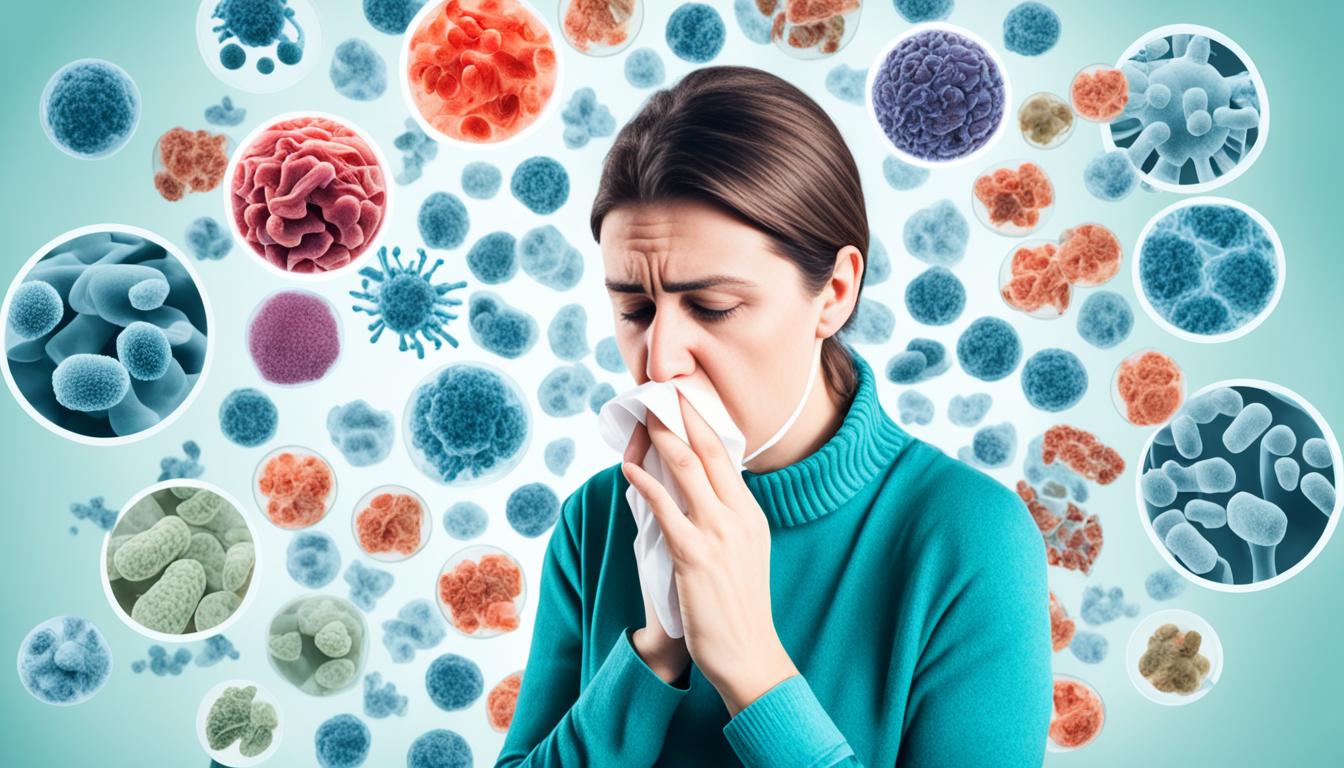Welcome to our guide on preventing respiratory infections and maintaining optimal lung health. In this section, we will provide you with practical strategies that can help you boost your defenses and reduce the risk of respiratory infections. By implementing these key tips, you can take proactive steps towards safeguarding your respiratory system.
Understanding Respiratory Infections
Before diving into prevention strategies, it’s important to understand what respiratory infections are. These infections can be caused by various pathogens, including bacteria, viruses, and fungi, that affect the respiratory system. Common respiratory infections include the flu, common cold, and pneumonia.
The flu, or influenza, is a highly contagious viral infection that primarily affects the nose, throat, and sometimes the lungs. It is characterized by symptoms such as fever, cough, sore throat, body aches, and fatigue. The flu virus can spread through respiratory droplets when an infected person coughs, sneezes, or talks.
The common cold, also known as a viral upper respiratory infection, is caused by different types of viruses. It is characterized by symptoms such as a runny or stuffy nose, sneezing, sore throat, cough, and mild fatigue. Like the flu, the common cold can spread through respiratory droplets or by touching contaminated surfaces and then touching the face.
Pneumonia is an infection that inflames the air sacs in one or both lungs. It can be caused by bacteria, viruses, or fungi. Symptoms of pneumonia include cough, chest pain, rapid breathing, fever, chills, and fatigue. Pneumonia can be transmitted through respiratory droplets or by inhaling airborne pathogens.
Understanding the causes, symptoms, and transmission methods of respiratory infections is crucial for taking appropriate prevention measures. In the following sections, we will explore practical strategies to reduce the risk of respiratory infections and promote optimal lung health.
Strengthening Your Immune System
A strong immune system is essential in preventing respiratory infections. By adopting various strategies to strengthen your immune system, you can effectively reduce the likelihood of falling ill. Here are some key tips to help boost your immune system and promote overall well-being:
- Maintain a Healthy Lifestyle: Engage in regular physical activity, practice good hygiene, and manage stress levels to support your immune system.
- Eat a Balanced Diet: Consume a variety of nutrient-rich foods, including fruits, vegetables, lean proteins, whole grains, and healthy fats, to provide your body with essential vitamins and minerals.
- Stay Physically Active: Engaging in regular exercise can enhance your immune system by improving circulation and promoting the production of antibodies.
- Manage Stress Levels: Chronic stress can weaken the immune system, so it’s important to incorporate stress management techniques into your routine, such as meditation, deep breathing exercises, or engaging in hobbies that you enjoy.
- Get Adequate Sleep: Aim for 7-9 hours of quality sleep each night to support your immune system’s ability to fight off infections.
- Avoid Smoking and Excessive Alcohol Consumption: These habits can impair your immune system and make you more susceptible to respiratory infections.
To illustrate the significance of a strong immune system in preventing respiratory infections, take a moment to visualize the image below:
By adopting these healthy habits, you can strengthen your immune system and reduce the risk of respiratory infections, ultimately leading to a healthier and more vibrant life.
Practicing Good Respiratory Hygiene
Proper respiratory hygiene is crucial for preventing the spread of respiratory infections. By following a few simple steps, you can protect yourself and others from contagious diseases. One of the most important practices is to cover your mouth and nose with a tissue or your elbow when you cough or sneeze. This helps prevent the release of respiratory droplets that may contain harmful viruses or bacteria.
In addition to covering your mouth and nose, washing your hands frequently is essential. Use soap and water to thoroughly clean your hands for at least 20 seconds, especially after coughing, sneezing, or being in public places. If soap and water are not available, use a hand sanitizer containing at least 60% alcohol. This helps eliminate any pathogens that may be present on your hands.
Avoiding close contact with individuals who are sick can also significantly reduce your risk of respiratory infections. When someone around you is coughing or sneezing, try to maintain a distance of at least six feet. This prevents the inhalation of respiratory droplets that may contain infectious particles. Moreover, keeping your living and working spaces clean and well-ventilated can help minimize the presence of viruses and bacteria in the air.
In summary, practicing good respiratory hygiene is a powerful way to prevent respiratory infections. Remember to cover your mouth and nose, wash your hands regularly, avoid close contact with sick individuals, and maintain cleanliness in your environment. By implementing these simple measures in your daily routine, you can contribute to the overall well-being of yourself and those around you.






